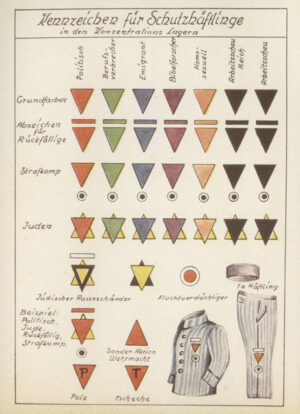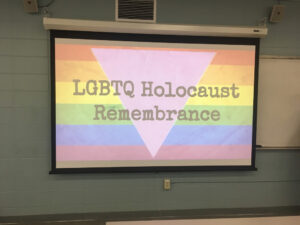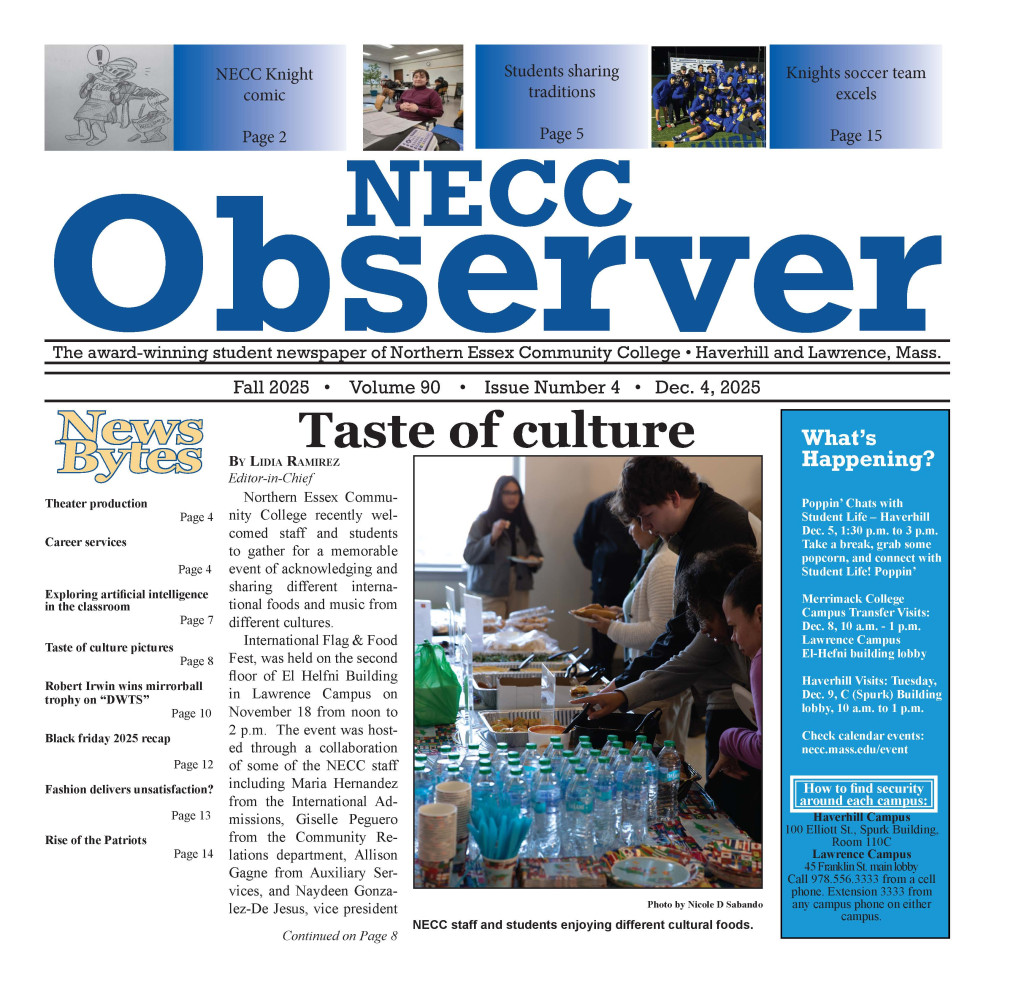The Gender & Sexuality Alliance present crucial lost history to NECC
International Holocaust Remembrance Day was celebrated on Sunday, Jan 27 this year, commemorating those who lost their lives during the Holocaust in World War II. This year the Gender and Sexuality Alliance club at NECC presented their own take on this with the LGBTQ Holocaust Remembrance on Wednesday Feb 6. The GSA meets every Wednesday from 12 p.m. to 1:30 p.m. in room C104.
“GSA strives to bring acceptance, educate, give support, advocate for the queer community and its allies regardless of gender and sexuality. [It is] a safe

and progressive space.” says GSA President Colby Patrie. Patrie has been the president of the club for three years, and does many of the presentations covering a wide variety of LGBTQ subjects. This time he covered the history of the LGBTQ community in World War II and how they faced ridicule, prejudice, and imprisonment by the Nazi Party.
The erasure of LGBTQ culture began in Berlin in 1933 where the Institute of Sexology, founded by Magnus Hirschfeld (1868-1935), was attacked by Nazi Youth and about 20,000 books and journals were destroyed, as well as 5,000 photos. With the revision of Paragraph 175 of the German Criminal Code that made homosexual encounters between men illegal, this made the LGBTQ community extremely vulnerable.
The persecution of homosexuals began with the murder of Ernst Röhm (1887-1934). He was a close friend to Adolf Hitler and was openly gay. However there were rumors being spread about them that they were gay, and that Rohm was attempting to overthrow Hitler. Röhm was described as a “hard macho” gay and despised the effeminate gays. After he was killed, Hitler used Röhm’s sexuality as justification to send homosexuals to concentration camps. Also because they could not reproduce, gay men were seen against the plan to create a “master race.”
Between 1935 and 1945 an estimated 100,000 homosexual men were arrested. Between 5,000 and 15,000 were confined to concentration camps after about 50,000 were convicted and sent to prisons. Homosexuals were identified with a pink triangle on their uniforms.
Until 2002, homosexual concentration camp prisoners were not recognized as victims; they were put on sex offender lists just for their sexual orientation. An apology was addressed that year by the German government. Since then there have been memorials placed around the world honoring the homosexuals who lost their lives in the Holocaust. There have been memoirs and plays written by survivors such as “Bent” by Martin Sherman. The documentary “Paragraph 175” shows historian Klaus Müller interviewing several survivors of the persecution of homosexuals.
[pullquote]
“Every student comes into college knowing what the holocaust was, and having a general idea that it included persecution and genocide of Jewish people….but few are aware that other groups were included in this genocide, including LGBTQ people.”
– Kristi Arford
[/pullquote]
“I wanted to educate people that the Holocaust wasn’t just about Jewish people; gays were also persecuted even after the liberation and not many people know that. I didn’t even know they were a part of it until a few years ago,” says Patrie.
Throughout the presentation, students reported that when learning about the Holocaust in high school or before, they were not aware that the Nazis also imprisoned people in the LGBTQ community. “In sophomore year of high school I learned in depth about concentration camps, but I didn’t know it affected anyone [else] besides the Jews.” says Kaily Burke, a student and member of GSA.
So what could this mean about the way history and the LGBTQ community have been represented? A large part of it could be blamed on historical censorship. The students at the presentation discussed and agreed that the education system in the United States has actively deterred its students from learning about anything LGBTQ related, its history, and figures. The saying, “History is written by the winners” here is no cliche, as today’s internet uncovers the obscure facts that the victors tried to erase. Kristi Arford, Anthropology Professor and GSA Adviser, said that during college in the 1990’s was when she learned that the LGBTQ community were victims in the Holocaust.

“I think the lack of awareness [seen] at the Holocaust presentation clearly indicates a need for high schools and colleges incorporate these topics into the curriculum! Every student comes into college knowing what the Holocaust was, and having a general idea that it included persecution and genocide of Jewish people….but few are aware that other groups were included in this genocide, including LGBTQ people,” says Arford.
From speculation of historical figures to analyzing documents and stories, this topic alone could have its own article. Arford says that the main trouble with spreading this information is the lack of attendance in these kind of presentations. “I think it’s important for faculty to encourage students to attend these presentations. Often requiring students to go and/or offering incentives like bonus points is the only way to actually get students to attend, unfortunately. Hopefully we faculty can work together to find ways to encourage greater attendance to these events, or even to incorporate these topics into our courses!” says Arford.
The GSA has other events planned within the month to present more topics within the LGBTQ community. Their next presentation is about self love. Topics such as accepting oneself, how to watch out for red flags in a relationship, and open discussion about what people like about each other what they would want to change will be addressed.
There will also be a presentation about Queer Black History at the end of February to celebrate Black History Month.
For more information about the GSA and its events, you can contact club advisers Kristi Arford (karford@necc.mass.edu) or Lisette Espinoza (lespinoza@necc.mass.edu).

